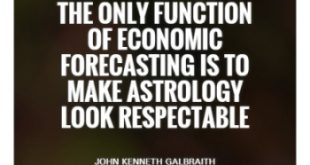The best clue to a nation’s growth potential The economic implications of gender discrimination are most serious. To deny women is to deprive a country of labor and talent, but — even worse — to undermine the drive to achievement of boys and men. One cannot rear young people in such wise that half of them think themselves superior by biology, without dulling ambition and devaluing accomplishment … To be sure, any society will have its achievers no matter...
Read More »The power of simple models …
The power of simple models … The need for coworker interaction explains the existence of a common workweek, but not why that workweek is 40 hours long instead of 30. This is the question that the economic model of labor supply really helps us to answer. The model says that the workweek is 40 hours long because, on the average, that’s how long workers want it to be. If most people found an extra hour of leisure much more valuable than an extra hour’s wage,...
Read More »The representative agent — providing pseudo-microfoundations for macro models
The representative agent — providing pseudo-microfoundations for macro models Suppose that the aggregate choice of society does coincide with that of the representative individual, both before and after that change. This reflects a pious hope, but at least with this heroic assumption we should be able to use the model to make policy recommendations. Since the economy’s behavior is properly represented by one individual, it might seem that we merely have to...
Read More »Income inequality and educational outcomes
Income inequality and educational outcomes A new paper by economists Katherine Michelmore of Syracuse University and Susan Dynarski of the University of Michigan … use administrative data from the state of Michigan to look at how economic disadvantages affect standardized test scores. Many studies on this question will look at the achievement gap during a single year and use a measure of disadvantage such as being eligible for subsidized school lunches. But...
Read More »Miscarriage of justice
[embedded content]
Read More »AD/AS models and the ‘disappearance’ of involuntary unemployment
AD/AS models and the ‘disappearance’ of involuntary unemployment We have indeed come round in a circle. The whole vision of the working of the macrosystem presented, in terms of the AD/AS model, by far too many contemporary textbooks, is essentially pre-Keynesian. Monetary spending may fluctuate, but whether or not such fluctuations affect employment and output is said to depend on reactions affecting real wages. Slow adjustment of money wages to price...
Read More »Känn ingen sorg för mig Göteborg
Känn ingen sorg för mig Göteborg [embedded content] Freddie Wadling 1951-2016 RIP
Read More »The microfoundationalist delusion
The microfoundationalist’s fantasy has a powerful hold on macroeconomists. They recognize that an agent-by-agent reconstruction of the economy is not feasible, but they argue that it is something that we could do “in principle,” and that the in-principle claim warrants a particular theoretical strategy. The strategy is to start with the analysis of a single agent and to build up through ever more complex analyses to a whole economy … The implicit argument in favor of...
Read More »Saint Ralph (personal)
[embedded content] One of my absolute favourites. A gem of a movie showing the importance of chasing miracles. Hallelujah!
Read More »Friedman’s ‘as if’ methodology — a total disaster
Friedman’s ‘as if’ methodology — a total disaster The explicit and implicit acceptance of Friedman’s as if methodology by mainstream economists has proved to be disastrous. The fundamental paradigm of economics that emerged from this methodology not only failed to anticipative the Crash of 2008 and its devastating effects, this paradigm has proved incapable of producing a consensus within the discipline of economics as to the nature and cause of the...
Read More » Lars P. Syll
Lars P. Syll







